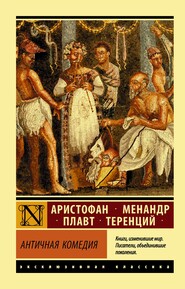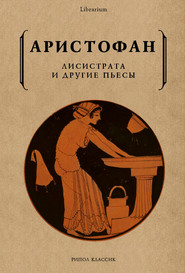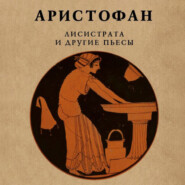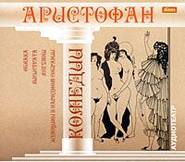По всем вопросам обращайтесь на: info@litportal.ru
(©) 2003-2024.
✖
The Eleven Comedies, Volume 2
Автор
Год написания книги
2018
Настройки чтения
Размер шрифта
Высота строк
Поля
EPOPS. I am looking.
PISTHETAERUS. Now look upwards.
EPOPS. I am looking.
PISTHETAERUS. Turn your head round.
EPOPS. Ah! 'twill be pleasant for me, if I end in twisting my neck!
PISTHETAERUS. What have you seen?
EPOPS. The clouds and the sky.
PISTHETAERUS. Very well! is not this the pole of the birds then?
EPOPS. How their pole?
PISTHETAERUS. Or, if you like it, the land. And since it turns and passes through the whole universe, it is called, 'pole.'[197 - From [Greek: polein], to turn.] If you build and fortify it, you will turn your pole into a fortified city.[198 - The Greek words for pole and city ([Greek: polos] and [Greek: polis]) only differ by a single letter.] In this way you will reign over mankind as you do over the grasshoppers and cause the gods to die of rabid hunger.
EPOPS. How so?
PISTHETAERUS. The air is 'twixt earth and heaven. When we want to go to Delphi, we ask the Boeotians[199 - Boeotia separated Attica from Phocis.] for leave of passage; in the same way, when men sacrifice to the gods, unless the latter pay you tribute, you exercise the right of every nation towards strangers and don't allow the smoke of the sacrifices to pass through your city and territory.
EPOPS. By earth! by snares! by network![200 - He swears by the powers that are to him dreadful.] I never heard of anything more cleverly conceived; and, if the other birds approve, I am going to build the city along with you.
PISTHETAERUS. Who will explain the matter to them?
EPOPS. You must yourself. Before I came they were quite ignorant, but since I have lived with them I have taught them to speak.
PISTHETAERUS. But how can they be gathered together?
EPOPS. Easily. I will hasten down to the coppice to waken my dear Procné;[201 - As already stated, according to the legend, accepted by Aristophanes, it was Procné who was turned into the nightingale.] as soon as they hear our voices, they will come to us hot wing.
PISTHETAERUS. My dear bird, lose no time, I beg. Fly at once into the coppice and awaken Procné.
EPOPS. Chase off drowsy sleep, dear companion. Let the sacred hymn gush from thy divine throat in melodious strains; roll forth in soft cadence your refreshing melodies to bewail the fate of Itys,[202 - The son of Tereus and Procné.] which has been the cause of so many tears to us both. Your pure notes rise through the thick leaves of the yew-tree right up to the throne of Zeus, where Phoebus listens to you, Phoebus with his golden hair. And his ivory lyre responds to your plaintive accents; he gathers the choir of the gods and from their immortal lips rushes a sacred chant of blessed voices. (The flute is played behind the scene.)
PISTHETAERUS. Oh! by Zeus! what a throat that little bird possesses. He has filled the whole coppice with honey-sweet melody!
EUELPIDES. Hush!
PISTHETAERUS. What's the matter?
EUELPIDES. Will you keep silence?
PISTHETAERUS. What for?
EUELPIDES. Epops is going to sing again.
EPOPS (in the coppice). Epopoi, poi, popoi, epopoi, popoi, here, here, quick, quick, quick, my comrades in the air; all you, who pillage the fertile lands of the husbandmen, the numberless tribes who gather and devour the barley seeds, the swift flying race who sing so sweetly. And you whose gentle twitter resounds through the fields with the little cry of tio, tio, tio, tio, tio, tio, tio, tio; and you who hop about the branches of the ivy in the gardens; the mountain birds, who feed on the wild olive berries or the arbutus, hurry to come at my call, trioto, trioto, totobrix; you also, who snap up the sharp-stinging gnats in the marshy vales, and you who dwell in the fine plain of Marathon, all damp with dew, and you, the francolin with speckled wings; you too, the halcyons, who flit over the swelling waves of the sea, come hither to hear the tidings; let all the tribes of long-necked birds assemble here; know that a clever old man has come to us, bringing an entirely new idea and proposing great reforms. Let all come to the debate here, here, here, here. Torotorotorotorotix, kikkobau, kikkobau, torotorotorotorolililix.
PISTHETAERUS. Can you see any bird?
EUELPIDES. By Phoebus, no! and yet I am straining my eyesight to scan the sky.
PISTHETAERUS. 'Twas really not worth Epops' while to go and bury himself in the thicket like a plover when a-hatching.
PHOENICOPTERUS. Torotina, torotina.
PISTHETAERUS. Hold, friend, here is another bird.
EUELPIDES. I' faith, yes! 'tis a bird, but of what kind? Isn't it a peacock?
PISTHETAERUS. Epops will tell us. What is this bird?
EPOPS. 'Tis not one of those you are used to seeing; 'tis a bird from the marshes.
PISTHETAERUS. Oh! oh! but he is very handsome with his wings as crimson as flame.
EPOPS. Undoubtedly; indeed he is called flamingo.[203 - An African bird, that comes to the southern countries of Europe, to Greece, Italy, and Spain; it is even seen in Provence.]
EUELPIDES. Hi! I say! You!
PISTHETAERUS. What are you shouting for?
EUELPIDES. Why, here's another bird.
PISTHETAERUS. Aye, indeed; 'tis a foreign bird too. What is this bird from beyond the mountains with a look as solemn as it is stupid?
EPOPS. He is called the Mede.[204 - Aristophanes amusingly mixes up real birds with people and individuals, whom he represents in the form of birds; he is personifying the Medians here.]
PISTHETAERUS. The Mede! But, by Heracles! how, if a Mede, has he flown here without a camel?
EUELPIDES. Here's another bird with a crest.
PISTHETAERUS. Ah! that's curious. I say, Epops, you are not the only one of your kind then?
EPOPS. This bird is the son of Philocles, who is the son of Epops;[205 - Philocles, a tragic poet, had written a tragedy on Tereus, which was simply a plagiarism of the play of the same name by Sophocles. Philocles is the son of Epops, because he got his inspiration from Sophocles' Tereus, and at the same time is father to Epops, since he himself produced another Tereus.] so that, you see, I am his grandfather; just as one might say, Hipponicus,[206 - This Hipponicus is probably the orator whose ears Alcibiades boxed to gain a bet; he was a descendant of Callias, who was famous for his hatred of Pisistratus.] the son of Callias, who is the son of Hipponicus.
PISTHETAERUS. Then this bird is Callias! Why, what a lot of his feathers he has lost![207 - This Callias, who must not be confounded with the foe of Pisistratus, had ruined himself.]
EPOPS. That's because he is honest; so the informers set upon him and the women too pluck out his feathers.
PISTHETAERUS. By Posidon, do you see that many-coloured bird? What is his name?
EPOPS. This one? 'Tis the glutton.
PISTHETAERUS. Is there another glutton besides Cleonymus? But why, if he is Cleonymus, has he not thrown away his crest?[208 - Cleonymus had cast away his shield; he was as great a glutton as he was a coward.] But what is the meaning of all these crests? Have these birds come to contend for the double stadium prize?[209 - A race in which the track had to be circled twice.]











